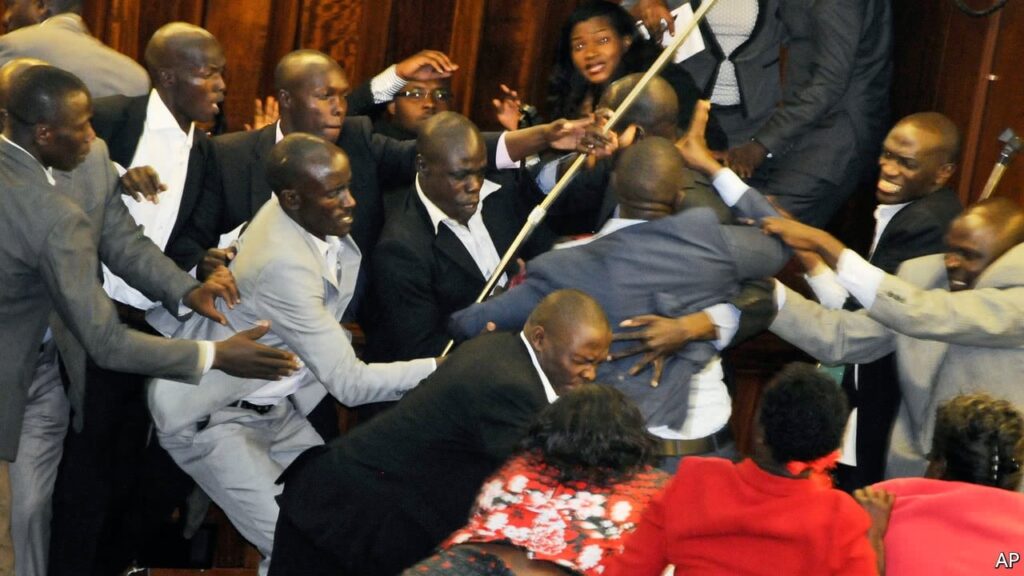www.mutoonline.com

photo; courtesy the economist (https://www.economist.com/the-economist-explains/2017/10/03/why-ugandas-politics-are-failing-its-people)
In recent years, Uganda has experienced a tumultuous socio-political landscape, marked by instability, corruption, and social unrest. From political controversies to economic struggles, the nation finds itself amidst a whirlwind of challenges. This essay delves into the factors contributing to Uganda's turbulent state and explores potential pathways towards stability and progress.
Political Turmoil: Uganda's political scene has been marred by controversy and uncertainty. The prolonged presidency of Yoweri Museveni, in power since 1986, has raised concerns about democratic governance and the perpetuation of a one-party rule. Furthermore, the 2021 general elections were marred by allegations of electoral fraud, suppression of opposition voices, and violence, casting doubt on the legitimacy of the political process.
Economic Challenges: The Ugandan economy faces significant hurdles, including high unemployment rates, widespread poverty, and income inequality. While the country boasts natural resources and potential for growth, mismanagement, corruption, and inadequate infrastructure hinder economic development. Moreover, the COVID-19 pandemic exacerbated existing vulnerabilities, highlighting the need for robust social safety nets and sustainable economic policies.
Social Unrest: Social tensions in Uganda have escalated in response to perceived injustices and grievances. Youth unemployment, inadequate access to education and healthcare, and human rights abuses fuel discontent among the populace. Additionally, ethnic and religious divisions occasionally flare up, posing further challenges to national unity and cohesion.
Corruption and Governance: Corruption remains a pervasive issue in Uganda, permeating various sectors of society and hindering progress. The misuse of public funds, bribery, and nepotism undermine trust in government institutions and impede effective service delivery. Addressing corruption requires comprehensive reforms, including enhanced transparency, accountability mechanisms, and judicial independence.
Human Rights Concerns: Uganda grapples with human rights abuses, including restrictions on freedom of expression, assembly, and the press. Reports of arbitrary arrests, torture, and extrajudicial killings raise alarm about the state of civil liberties and the rule of law. Upholding human rights is paramount for fostering a just and inclusive society, necessitating efforts to strengthen legal protections and ensure accountability for rights violations.
Pathways to Stability and Progress: Despite the myriad challenges facing Uganda, there are avenues for positive change and advancement. Meaningful political reforms, including electoral transparency, term limits, and inclusive governance, can bolster democratic institutions and foster public trust. Additionally, prioritizing economic diversification, investment in infrastructure, and job creation can stimulate growth and alleviate poverty.
Furthermore, combating corruption through institutional reforms, anti-corruption measures, and civic education is essential for restoring integrity and accountability in government. Promoting social cohesion, dialogue, and reconciliation can bridge divides and promote national unity amidst diversity. Moreover, upholding human rights and strengthening legal protections are vital for safeguarding individual liberties and promoting a culture of respect and dignity.
In conclusion, Uganda faces formidable challenges on multiple fronts, from political instability and economic struggles to social unrest and human rights concerns. However, amidst the chaos, there lies an opportunity for transformative change and progress. By addressing underlying issues, fostering inclusive governance, and upholding fundamental rights, Uganda can chart a course towards a more stable, prosperous, and equitable future. It is through collective efforts, both domestically and internationally, that Uganda can overcome its current challenges and realize its full potential as a vibrant and resilient nation.

